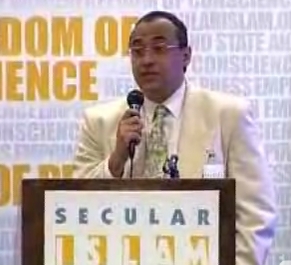Muslims often complain that the West only looks their way when there is something negative to say about Islam and its people. This time, they have a point. A most extraordinary event took place earlier this month in St. Petersburg, Fla., and it received only scant attention outside the blogosphere. The Secular Islam Summit brought together some 200 delegates determined to speak their mind about the direction of the Muslim world and to redraw the battle lines of today's overarching ideological conflict. Describing themselves as "secular persons of Muslim societies," and explaining that they are "believers, doubters, and unbelievers," they redefined the battle as "a great struggle, not between the West and Islam, but between the free and the unfree." The two-dozen speakers who rose to the podium represent a most extraordinary sampling of the sheer courage one can find among passionately moderate Muslims. Many of them live in the shadow of death threats from angry extremists and of Fatwas from religious authorities. Others, who did not make it to the meeting, have already paid with their lives for speaking of the need for reform in the Muslim world. The list of those who signed the "St. Petersburg Declaration" includes truly heroic figures, like Mithal Al-Alusi, the progressive Iraqi legislator whose two sons were murdered before of his eyes after he traveled to Israel for an anti-terrorism conference in 2004. Despite continuing attempts on his life, he takes every opportunity to stand up for democracy and say that secular, not religious, law should govern Iraq and the Middle East. The first signature on the Declaration is that of Ayaan Hirsi Ali, the Somali refugee who rose to become a member of the Dutch parliament. Now living in the United States, she remains a fierce advocate for the rights of Muslim women, as well as a critic of Europeans' tolerance of Muslim extremism in their midst. Hirsi Ali's partner in the production of a controversial movie about Islam, filmmaker Theo van Gogh, was murdered and nearly beheaded by a Dutch Muslim radical. The assassin stabbed a letter, a death threat addressed to Hirsi Ali, into the lifeless body of his victim. The threat shook her, but did not silence her. Other delegates, such as Irshad Manji and Nonie Darwish, have spoken against the virulent anti-Semitism that permeates radical -- and not-so-radical Islam. Darwish, an Egyptian, is founder of ArabsforIsrael.com.
<<ad>>
Delegates asserted the need to separate "personal faith" from "political doctrine" and they reaffirmed the equality of all people -- including Christians, Jews, Hindus, and non-believers. That sounds tame in Florida, but in some Muslim countries it's downright revolutionary.
Secular Muslims Speak Out: Are We Listening?

